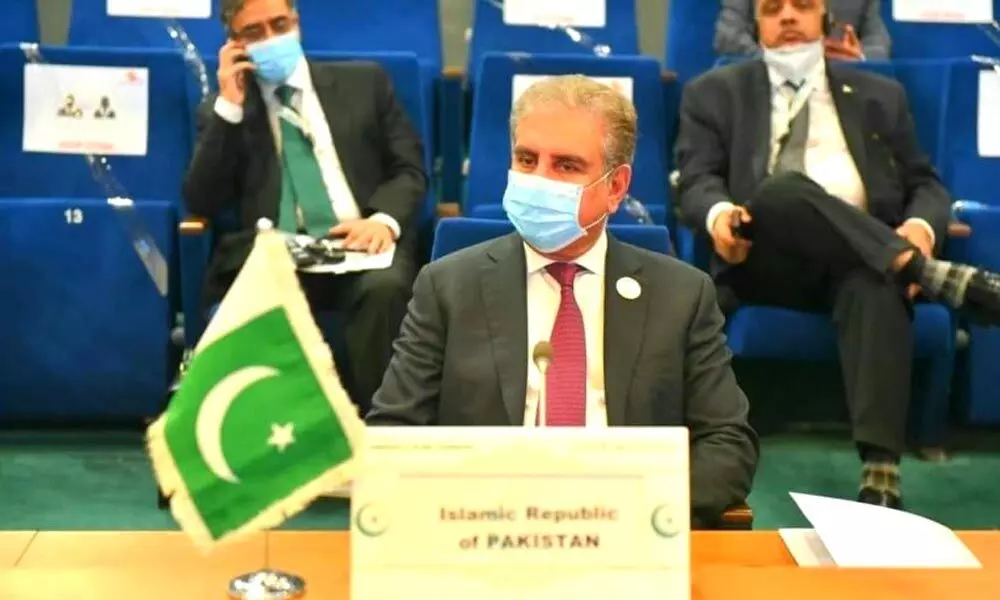Tajik snub to Pak's bid for Taliban recognition
The unstated purpose of Qureshi mission was to catapult Pakistan as the most important regional player influencing the future of war-ravaged Afghanistan
image for illustrative purpose

A 'chicken neck' like territory of Northern Afghanistan surrounded by Tajikistan is still to accept the Taliban supremacy. Tajik President Rahmon told a crestfallen Qureshi that he would not recognise a government formed through 'oppression'. Not words that Qureshi expected to hear from his host
Kabul/New Delhi: RHAPSODISING over the takeover of Afghanistan by medieval marauders, Pakistan has begun a hectic diplomacy campaign to seek recognition for the government in Kabul. And, Foreign Minister Shah Mahmood Qureshi suffered a snub at his very first stop, Dushanbe. He had no choice but to stomach the insult as he apparently did not do his homework before meeting President Emomali Rahmon.
The Tajik leader is unlikely to change his stand when he meets Pakistan Prime Minister Imran Khan on the sidelines of the Shanghai Cooperation Organisation (SCO) summit. For Rahmon, the immediate concern is the threat at his country's borders. He is walking the extra mile to beef up border security. Russia has rushed new weapon systems to its military base in Tajikistan.
A 'chicken neck' like territory of Northern Afghanistan surrounded by Tajikistan is still to accept the Taliban supremacy. Tajik President Rahmon told a crestfallen Qureshi that he would not recognise a government formed through 'oppression'. Not words that Qureshi expected to hear from his host.
The unstated purpose of Qureshi mission was to catapult Pakistan as the most important regional player influencing the future of war-ravaged Afghanistan. China and Russia also keen to jump on the Afghan bandwagon to undo what they consider as historical wrongs.
Yet, Russia, like Tajikistan, has its reservations on Taliban; it is also in no hurry to recognise the regime that Pakistan has installed. In fact, it is this concern over Pakistani hand that is compelling the West to seek guarantees of good behaviour as much from Taliban as from Pakistan. Russian President Vladmir Putin used the BRICS forum to articulate his concern over terrorism emanating from Talibanised Afghanistan. The SCO summit is also focused on the Afghan issue.
Russia is lending its ears to the Central Asian countries that have felt uneasy over Taliban 2.0. The militant groups active in Central Asian Republics and even Russia and China have safe havens in Afghanistan and Pakistan. The Tajik capital had played an important role during the Indian evacuation mission which saw hundreds of people being brought to the safety of India. This could not have made Pakistan very happy. But Qureshi could not have conveyed his unhappiness to his Tajik host.
As Foreign Minister during Gen Pervez Musharraf rule, the garrulous Qureshi was in New Delhi when Pakistani terrorists trained by JeM chief Maulana Masood Azhar attacked India's financial capital, Mumbai and killed over 160 people including a number of Americans. Qureshi advocacy about the peaceful intentions of the Taliban is a cruel joke since militant cadres of Masood Azhar (and Hafiz Saeed of Lashkar-e-Taiba, LeT) had fought shoulder-to-shoulder with the Taliban and paved the way for their triumphant march.
Two days after the Taliban flag started fluttering over the Presidential palace on August 15, JeM chief landed in Afghanistan to work out tradeoffs for the Kashmir theatre, according to Pakistani Urdu media. He met the Taliban top brass at their Kandahar headquarters and secured the nod for help in JeM forays into Kashmir to unsettle India.
Both the JeM and LeT are set to shift their bases to Southern Afghanistan to provide a reprieve to Pakistan from FATF sanctions (for terrorism financing). Like them, the Taliban are the creations of Pakistan Army's eyes and ears, Inter-Services Intelligence (ISI).
Any lingering doubts about ISI factor on the Kabul theatre were set at rest when ISI chief Lt General Faiz Hameed flew into the Afghan capital and arm-twisted the Taliban into making Sirajuddin Haqqani the new security Tsar.
Leaking roofs say the Kabul meddling earned Hameed a reprimand from Army Chief Gen Qamar Javed Bajwa. Because, his September 4 visit was without proper disciplinary protocol, which, in plain terms, means approval from his boss. An inquiry followed. When Hameed arrived at the office of Adjutant General at the GHQ (September 10) to face the inquiry, he was humiliated, according to a report that also says that the ISI flag was stripped of his vehicle before it was allowed to enter the GHQ premises.
Hameed reportedly "accepted the charges and asked for pardon".
By tradition, the ISI chief is always the personal choice of Army Chief and the incumbent is not known to indulge in one-upmanship games.
Hameed bravado was apparently a fall-out of radicalisation of the Pakistan Army particularly at the middle level, which sees close affinity with the hard-line Islamist outfits like the Haqqanis.
The installation of Sirajuddin Haqqani as the Interior Minister went against the plans of Gen Bajwa, whose concern is the larger picture of projecting a moderate facade both for Taliban rulers and Pakistan.
He has just elevated a Shia officer, Lt General Azhar Abbas as Chief of General Staff (CGS). And it raised alarm in the predominantly Sunni Army. The story may take some twists and turns as Lt General Faiz Hameed is eyeing the top post which will fall vacant in under a year.
This digression into the power struggle in the Pakistan Army is only to put the spot light on the soft underbelly of Pakistan. And, to underline the absurdity of Qureshi contention that Taliban are peace angels. As the Tajik President warned, 'indifference' to the current situation in Afghanistan could lead to a 'protracted civil war.' After Tajikistan, Qureshi travelled to Uzbekistan, Turkmenistan and Iran, where also disappointment was in store for him.

